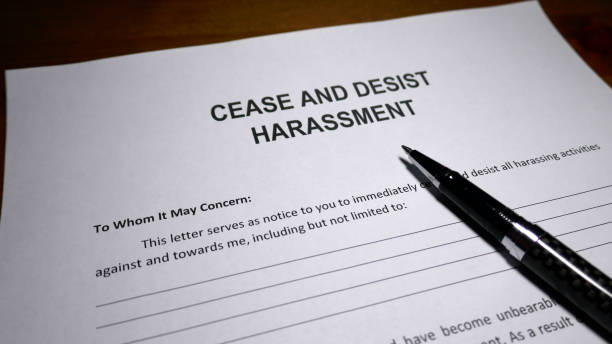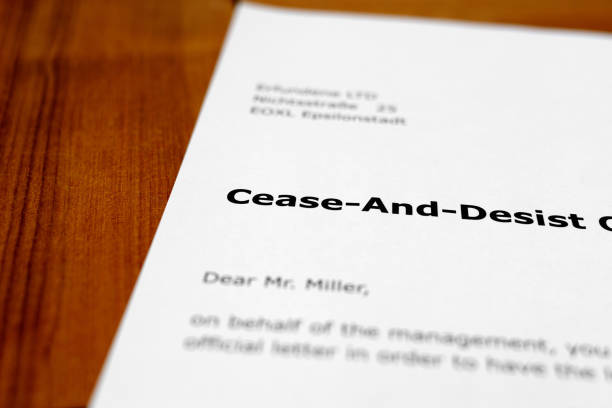A person may send a cease and desist letter to another party when they are engaging in some harmful, illegal or malicious activity. It is a formal demand and it is a part of a legal action. Before litigation, a law firm generally sends this legal document to a party on behalf of their client.
A cease and desist can either be in the form of a letter, or a court order. Such an order is legally enforceable. We’ll explore various points in relations to this subject in this article.
What Are the Purposes of a Cease and Desist Letter?
As mentioned above, a party firstly alerts the other party of their breach. Secondly, a party requests the other party to stopthe activity i.e cease and desist. Lastly, it can serve as a warning to the other party, and alert them regarding prospects of legal proceedings such as for damages claims.
Cease and desist orders are slightly different, in that the court grants an enforceable cease and desist order only after the parties shave commenced legal proceedings.
Courts generally make these orders before a trial. Following a trial, the courts can make permanent injunctions that order a party to stop engaging in a certain kind of activity. The court also considers the potential harm to both parties before making such orders.
Generally, the court will weigh things like the strength of each party’s case, the harm to the party seeking the order, and harm to the other party etc. But as always, it is alway recommended to first resolve disputes outside the courtroom. Sending a desist letter (cease and desist letter) is the best way to do that.
When approaching the court, the party has to file a lawsuit. Once the court has granted any order, it becomes legally enforceable and binding. If a party fails to comply with the order, the court can impose legal and criminal penalties.

Circumstances in Which Such Letters Are Used
In this section, we discuss some common instances wherein parties use these letters to alert another party of their illegal or harmful activity.
- Defamation
- Trademark infringement
- If they are violating or offending your rights
- Personal harassment or force or ambush
- Breach of trade commitments or contracts
Defamation
If a person makes false statements to ruin someone’s reputation, they are defaming someone. The aggrieved party can then issue these letters to the party making such false claims.
Cease and desist letters can also be termed as “Notice to Stop” or Demand letter. Defamation can either be in the form of libel i.e. a written defamatory statement, or slander i.e. a spoken defamatory statement.
Trademark Infringement
Trademark or copyright infringement is the use of a business name, or product (that has been registered as trademark) without permission. This is closely related to intellectual property. Business often protect their intellectual property using trademarks and copyright.
Violation of Personal Rights
This can include a number of things such as if someone invades your privacy, or makes attempts to stalk you or intimidate you, you can issue a desist letter against them.
Harassment or Bullying
This is a very serious issue, and is similar to violation of personal rights. If a party continues to harass or stalk, they can receive a notice to stop. This can also include people who persistently annoy you, or threaten you and repeatedly contacts you.
Violation of Contracts
If a person violates any terms of a binding contract under business law, the other party has solid reasonable grounds to issue a cease and desist letter against them. Violation of contracts can happen in any setting, be it in a workplace, between two business, or even in terms of lease agreements.
Options for Parties Responding to a Cease and Desist Letter Australia
If you have received a demand letter, it is important to contact the sender first. It does not always mean that you have engaged in conduct as alleged by the other party. However, even if you have not, you need to respond to the letter and you cannot ignore it.
Ideally, once you contact the sender, you can resolve the dispute without having to attend the court or without proceeding with litigation. Litigation is a costly and time-consuming procedure. It is best to tackle the issue among yourselves, with the help of you lawyers.
Once you get in touch with the sender, you can come to an agreement to resolve the dispute. Now, the receiver may either comply with the cease and desist letter or challenge it. The receiver must seek legal advice before proceeding.
There are two options for the receiver of the letter. They can either:
- Comply with the letter, contact the sender and reach an agreement to resolve the dispute. The receiver must then effectively stop their conduct that caused the party to send a notice to stop letter.
- Challenge the letter. This is a more formal process. The receiver will need to outline the grounds of challenging the letter, and send that to the sender. Once the receiver has challenged the letter, the two parties can either resolve the dispute through negations, or prepare for court proceedings.

Why Do You Need to Seek Legal Advice from a Lawyer?
Whether you wish to send cease and desist letters, or you have received one, it is crucial to have a lawyer by your side. Lawyers can help you with any legal action to tackle the matter at hand.
In fact, if the matter escalates such that you need to take further legal action and apply for a court order, you will require independent legal advice. If you are sending a letter, you need to ensure that it complies with legal authority, and involves points that make it legally valid.
Lawyers can help with drafting these important notices. If you need to go to court, and your letter is poorly drafted, unfortunately the court will not enforce it. Therefore, it is safer to engage lawyers for these purposes.
Our law firm and solicitors at JB Solicitors can help with civil lawsuits and other procedures. For more information on desist letters or any enquiries on legal consequences, do not hesitate to contact our lawyers at JB Solicitors.
